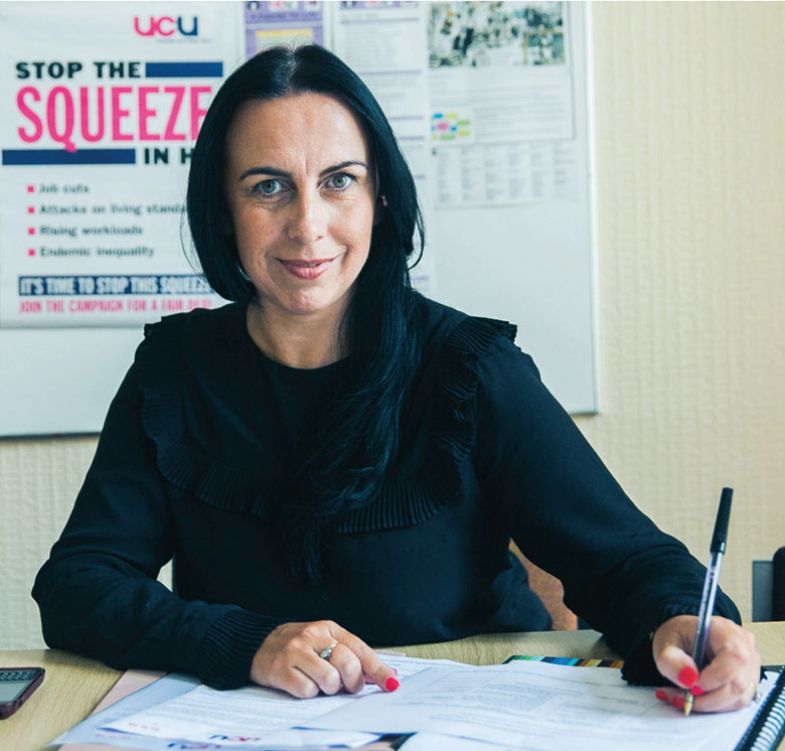This month, the 120,000-plus members of the UK’s main higher education union, the University and College Union, will receive their ballot papers to elect a new general secretary following the departure of Sally Hunt after 12 years at the helm.
It seems that the contest will be the closest in the UCU’s history. As it stands, three candidates – Jo Grady, Jo McNeill and Matt Waddup – have entered the field.
Looming over all this is last year’s 14-day strike over pensions provided by the Universities Superannuation Scheme. The dispute, which swelled the union’s membership and is widely seen as having energised it, remains unresolved: in the absence of a deal, employee and employer contributions are increasing this month.
Ms McNeill, the candidate for the UCU Left movement, believes that members should go back on strike if contributions rise again – as is planned – in October.

(Jo McNeill)
“Our members know the USS dispute isn’t over; it was paused at a crucial point,” Ms McNeill told Times Higher Education. “Without the possibility of industrial action, there is often no meaningful collective bargaining,” she said. “Trade unions need to be ready, when necessary, to take industrial action in defence of members’ pensions, pay and working conditions.”
Ms McNeill’s position has been questioned by some UCU members given that vice-chancellors have signed up to the settlement proposed by an independent review group, the joint expert panel, and have indicated that they are willing to contribute more to protect existing benefits if staff do too. Reopening strike action would not make sense if the problem lies with the USS trustees, rather than employers, they state.
However, Ms McNeill, president of the University of Liverpool’s UCU branch, is a firm advocate of the “no detriment” position, which says that employers should shoulder any extra pension costs in their entirety, pointing to the “record levels of surplus” in the sector. In any case, the “UCU has demolished the argument that there is a deficit in the pension scheme”, she added, calling it an “artefact of accounting generated by USS”.

(Jo Grady)
Dr Grady, senior lecturer in employment relations at the University of Sheffield, who won a seat on the union’s national executive committee in February, is also an advocate of the “no detriment” position. Dr Grady – a member of the USS Briefs activist group – told THE that “if the JEP’s recommendations are applied to a 2018 valuation, USS is not in deficit and no detrimental changes are needed”.
She also believes that further strike action may be necessary to help the UCU “take on the USS executive”. “Our dispute – despite the publication of the JEP – is still very much about the extent to which our employers are willing to stand with us and protect our scheme from its own managers,” she said. In a “ballot situation…I would hope Universities UK and our employers ask questions about decision-making by those within USS, and also consider calling for resignations”, she added on what might force a change of heart from the pension fund’s ruling body.
Having the “joint union- and employer-backed document” of the JEP has been vital, said Dr Grady, although both she and Ms McNeill voted in April against its formation, urging instead more strike action – a course rejected by voting members.
However, Dr Grady explained that she did so because she thought the UCU could “press for a better offer” with more strikes looming. “When I voted to stay on strike in April, I wasn’t voting against the JEP; I was voting to make our employers back up their words with meaningful actions,” she said.

(Matt Waddup)
Mr Waddup, the UCU’s head of policy and campaigns, backed the creation of the JEP at the time, and said that it was “absolutely the right decision”.
“Ending the strike when we did effectively took [the removal of guaranteed payouts and their replacement with more variable] defined contributions off the table and established the JEP,” he said.
On the future of the USS, Mr Waddup, too, asserted that “if USS were to implement the JEP now, it would not mean any increases [in contributions] at all”. However, he seemed more open to splitting additional costs between USS members and employers if required. “My own view is that the priority is to protect members’ benefits while keeping costs as low as possible,” he said.
Mr Waddup, vilified in The Times during the 2018 strike as a firebrand leftist, added that he was bemused by recent claims that he would be reluctant to call for strike action. “I make no apology about being militant on issues around casualisation and precarity,” he said. “If we want USS-style success [on such issues], we need USS-style planning [for industrial action], though people do accept that there will be a negotiated process.”
In the event that none of the three candidates wins an overall majority, the result will be decided on the transfer of second-choice votes. As such, an informal alliance between Ms McNeill and Dr Grady – who was backed by UCU Left in the NEC elections – could swing the vote away from Mr Waddup towards one of them.
Equally, a candidate who can engage a decent proportion of the membership – Ms Hunt won in 2017 with just over 8,000 votes on a 13.7 per cent turnout – might squeak over the line. Ballots will open on 29 April and close on 23 May – with the winner declared on the eve of the UCU’s congress.
POSTSCRIPT:
Print headline: Pension tactics central to UCU leadership race
Register to continue
Why register?
- Registration is free and only takes a moment
- Once registered, you can read 3 articles a month
- Sign up for our newsletter
Subscribe
Or subscribe for unlimited access to:
- Unlimited access to news, views, insights & reviews
- Digital editions
- Digital access to THE’s university and college rankings analysis
Already registered or a current subscriber?











